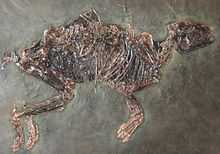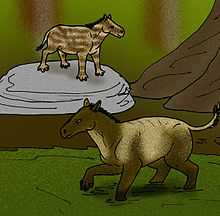Propalaeotherium
| Propalaeotherium Temporal range: Middle Eocene | |
|---|---|
 | |
| Fossil P. hassiacum specimen | |
| Scientific classification | |
| Kingdom: | Animalia |
| Phylum: | Chordata |
| Class: | Mammalia |
| Subclass: | Eutheria |
| Order: | Perissodactyla |
| Family: | Equidae |
| Genus: | Propalaeotherium Gervais, 1849 |
| Species | |
| |
Propalaeotherium was an early genus of equid endemic to Europe and Asia during the Middle Eocene.
Taxonomy

Propalaeotherium was named by Paul Gervais. Its name means "before Palaeotherium". It was considered a member of Palaeotheriidae by Hooker (1986).[1] A 2004 study found it to be an equid instead.[2]
The species P. parvulum and P. messelensis have been assigned to the equid genus Eurohippus.[3]
Description

Propalaeotheres were small animals, ranging from 30–60 cm at the shoulder weighing just 10 kg (22 lb)[4] They looked rather like very small tapirs. They had no hooves, having instead several small nail-like hooflets. They were herbivorous, and the amazingly well-preserved Messel fossils show that they ate berries, and leaf matter picked up from the forest floor.[5]
In popular culture
Propalaeotherium was featured in Walking With Beasts, where it is shown as a skittish foraging creature that is a prey item of Gastornis and Ambulocetus
See also
- List of mammals
- Evolution of the Horse
- List of prehistoric mammals
- Mammal
- Mammal classification
References
- ↑ J. J. Hooker. 1986. Mammals from the Bartonian (middle/late Eocene) of the Hampshire Basin, southern England. Bulletin of the British Museum (Natural History) 39(4):191-478
- ↑ Franzen, J. L. (2004). "First fossil primates from Eckfeld Maar, Middle Eocene (Eifel, Germany)". Eclogae Geologicae Helvetiae 97 (2): 213–220. doi:10.1007/s00015-004-1115-8.
- ↑ Franzen, J. L. (2006). "Eurohippus n.g., a new genus of horses from the Middle to Late Eocene of Europe". Senckenbergiana lethaea 86: 97–10. doi:10.1007/BF03043638.
- ↑ S. Legendre. 1988. Les communautes de mammiferes du Paleogene (Eocene superieur et Oligocene) d'Europe occidentale: structure, milieux et evolution. Ph.D. thesis, Universite des Sciences et Techniques du Languedoc, Montpellier, France. 2 volumes. 1-265.
- ↑ Wilde, V.; Hellmund, M. (2010). "First record of gut contents from a middle Eocene equid from the Geiseltal near Halle (Saale), Sachsen-Anhalt, Central Germany". Palaeobiodiversity and Palaeoenvironments 90 (2): 153. doi:10.1007/s12549-010-0028-y.